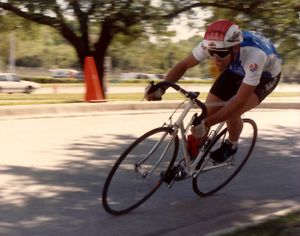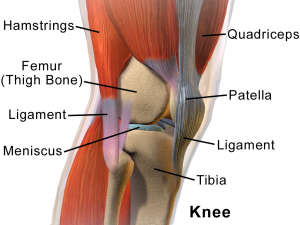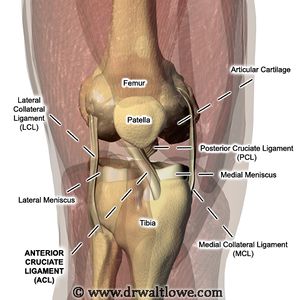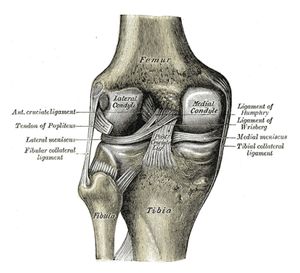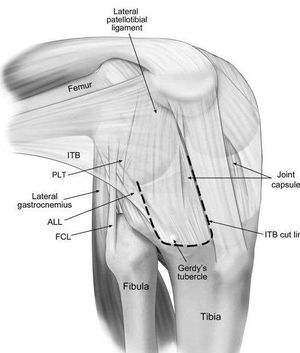Cyclist's Knee: Difference between revisions
(text refs) |
(media) |
||
| Line 8: | Line 8: | ||
== Cyclist's Knee - Relevant Anatomy == | == Cyclist's Knee - Relevant Anatomy == | ||
Most cyclists experience some knee pain over the cause in their riding career. A systematic review and various studies studies report the incidence of knee pain ranging from from 36% to 62%<ref>Bini R, Hume PA, Croft JL. [https://www.ncbi.nlm.nih.gov/pubmed/21615188 Effects of bicycle saddle height on knee injury risk and cycling performance.] Sports medicine. 2011 Jun 1;41(6):463-76. Available from: https://www.ncbi.nlm.nih.gov/pubmed/21615188 ( last accessed 28.8.2019)</ref> <ref>Johnston TE, Baskins TA, Koppel RV, Oliver SA, Stieber DJ, Hoglund LT. [https://www.ncbi.nlm.nih.gov/pmc/articles/PMC5717478/ The influence of extrinsic factors on knee biomechanics during cycling: a systematic review of the literature.] International journal of sports physical therapy. 2017 Dec;12(7):1023. Available from: https://www.ncbi.nlm.nih.gov/pmc/articles/PMC5717478/ (accessed 28.8.2019)</ref>and it is the second most reported overuse injury for cyclists<ref>Clarsen, Benjamin & Krosshaug, Tron & Bahr, Roald. (2010). [https://www.researchgate.net/publication/46288399_Overuse_Injuries_in_Professional_Road_Cyclists Overuse Injuries in Professional Road Cyclists.] The American journal of sports medicine. 38. 2494-501. 10.1177/0363546510376816. Available from: https://www.researchgate.net/publication/46288399_Overuse_Injuries_in_Professional_Road_Cyclists (last accessed 29.8.2019)</ref> (after [[Cyclist's Back]]). | Most cyclists experience some knee pain over the cause in their riding career. A systematic review and various studies studies report the incidence of knee pain ranging from from 36% to 62%<ref name=":2">Bini R, Hume PA, Croft JL. [https://www.ncbi.nlm.nih.gov/pubmed/21615188 Effects of bicycle saddle height on knee injury risk and cycling performance.] Sports medicine. 2011 Jun 1;41(6):463-76. Available from: https://www.ncbi.nlm.nih.gov/pubmed/21615188 ( last accessed 28.8.2019)</ref> <ref>Johnston TE, Baskins TA, Koppel RV, Oliver SA, Stieber DJ, Hoglund LT. [https://www.ncbi.nlm.nih.gov/pmc/articles/PMC5717478/ The influence of extrinsic factors on knee biomechanics during cycling: a systematic review of the literature.] International journal of sports physical therapy. 2017 Dec;12(7):1023. Available from: https://www.ncbi.nlm.nih.gov/pmc/articles/PMC5717478/ (accessed 28.8.2019)</ref>and it is the second most reported overuse injury for cyclists<ref>Clarsen, Benjamin & Krosshaug, Tron & Bahr, Roald. (2010). [https://www.researchgate.net/publication/46288399_Overuse_Injuries_in_Professional_Road_Cyclists Overuse Injuries in Professional Road Cyclists.] The American journal of sports medicine. 38. 2494-501. 10.1177/0363546510376816. Available from: https://www.researchgate.net/publication/46288399_Overuse_Injuries_in_Professional_Road_Cyclists (last accessed 29.8.2019)</ref> (after [[Cyclist's Back]]). | ||
[[File:Knee anatomy.png|right|frameless]] | [[File:Knee anatomy.png|right|frameless]] | ||
The [[knee]] ( see the link for comprehensive detail of the knee) sits between the upper and lower leg | The [[knee]] ( see the link for comprehensive detail of the knee) sits between the upper and lower leg. If any part of the lower kinematic chain ( [[Core stability|core]], [[Lumbar Assessment|lumbar]] spine, [[Hip Anatomy|hip]], [[knee]], [[Ankle and Foot|ankle]]) gets a problem it can pull on the knee joint changing the way the knee functions and cause knee pain. Due to the repetitive motion of the knee in cycling overuse injuries can occur when these incorrect tensions/torsions are applied to the knee. A 2017 review reported that cycling parameters (i.e., cadence and power output) and bicycle fit settings have differing effects on kinematics, kinetics, and muscle activity around the knee and how biomechanical factors and positioning on the bicycle can increase or decrease stress in specific areas of the knee joint.<ref>Johnston TE, Baskins TA, Koppel RV, Oliver SA, Stieber DJ, Hoglund LT. [https://www.ncbi.nlm.nih.gov/pmc/articles/PMC5717478/ The influence of extrinsic factors on knee biomechanics during cycling: a systematic review of the literature]. International journal of sports physical therapy. 2017 Dec;12(7):1023. Available from: https://www.ncbi.nlm.nih.gov/pmc/articles/PMC5717478/ (last accessed 29.8.2019)</ref> | ||
The knee joint is a complicated joint with various compartments that can be affected | The knee joint is a complicated joint with various compartments that can be affected | ||
| Line 23: | Line 23: | ||
Four Main Reasons for Knee Pain on the Bike | Four Main Reasons for Knee Pain on the Bike | ||
# Incorrect cleat alignment | # Incorrect cleat alignment | ||
# Incorrect saddle position | # Incorrect saddle position. A 2011 review concluded that correct saddle height (using the knee flexion angle method (25-30°)) reduced the risk of knee injuries and minimized oxygen uptake<ref name=":2" />. | ||
# Incorrect cadence | # Incorrect cadence | ||
# Poor flexibility and or strength of the core, pelvis and or flexors or extensors of lower limb kinetic chain<ref name=":0">SickBiker [https://www.youtube.com/watch?v=Xk0zaFyJXbg&app=desktop Bike Fitting - 4 Main Knee Pain Syndromes Of Cyclists. Saddle / cleats position]... Available from: https://www.youtube.com/watch?v=Xk0zaFyJXbg&app=desktop (last accessed 29.8.2019)</ref> | # Poor flexibility and or strength of the core, pelvis and or flexors or extensors of lower limb kinetic chain<ref name=":0">SickBiker [https://www.youtube.com/watch?v=Xk0zaFyJXbg&app=desktop Bike Fitting - 4 Main Knee Pain Syndromes Of Cyclists. Saddle / cleats position]... Available from: https://www.youtube.com/watch?v=Xk0zaFyJXbg&app=desktop (last accessed 29.8.2019)</ref> | ||
Three Main Regions of Knee Pain | Three Main Regions of Knee Pain | ||
# Anterior Knee Pain. Caused by increased pressure on the patella and surrounding soft tissues or incorrect tracking of the patella. This can arise from: saddle too low or positioned too far forward; tight hip or knee flexors casing patella to compress at at patella femoral joint; slow cadence putting much great force through knee; cleats causing tibial torsion resulting in incorrect patella tracking. | #Anterior Knee Pain[[File:Knee Anatomy.jpg|center|thumb]]Caused by increased pressure on the patella ( 2011 systematic review reporting patellofemoral compressive force seems to be inversely related to saddle height) and surrounding soft tissues or incorrect tracking of the patella. This can arise from: saddle too low or positioned too far forward<ref name=":3">Bini RR, Hume PA, Lanferdini FJ, Vaz MA. [https://www.ncbi.nlm.nih.gov/pubmed/23312729 Effects of moving forward or backward on the saddle on knee joint forces during cycling.] Physical Therapy in Sport. 2013 Feb 1;14(1):23-7. Available from: https://www.ncbi.nlm.nih.gov/pubmed/23312729 ( last accessed 29.8.2019)</ref>; tight hip or knee flexors casing patella to compress at at patella femoral joint; slow cadence putting much great force through knee; cleats causing tibial torsion resulting in incorrect patella tracking. | ||
# Posterior Knee Pain. Caused by increased forces applied to posterior knee joint and surrounding soft tissues. This can arise through: saddle too high or to far aft; tight calf, hamstrings or gluteals; cleats positions, foot too far forward on pedal. | #Posterior Knee Pain[[File:Knee-joint.jpg|center|frameless]]Caused by increased forces applied to posterior knee joint and surrounding soft tissues. This can arise through: saddle too high or to far aft<ref name=":3" />; tight calf, hamstrings or gluteals; cleats positions, foot too far forward on pedal. | ||
# Lateral or Medial Knee Pain. Caused by incorrect pressure applied through lateral or medial knee structures<ref name=":1">Bini RR, Bini AF. [https://www.ncbi.nlm.nih.gov/pmc/articles/PMC5973630/ Potential factors associated with knee pain in cyclists: a systematic review.] Open access journal of sports medicine. 2018;9:99. Available from: https://www.ncbi.nlm.nih.gov/pmc/articles/PMC5973630/ (last accessed 29.8.2019)</ref> A 2018 systematic review reported that an increased medial projection of their knees causes an altered activation of the vastus medialis and vastus lateralis muscles and was a potential cause of cyclists knee pain<ref name=":1" />.This can arise through: incorrect cleat alignment, toe pointing medial causing lateral stress, toe points lateral causing medial stress; tight medial or lateral structures eg TFL or thigh adductors; insufficient core or pelvic muscle power to stabilise pelvis for lower limb kinetic chain to function efficiently from.<ref name=":0" /> | #Lateral or Medial Knee Pain.[[File:Anterolateral-view-of-a-right-knee-showing-the-anterolateral-and-lateral-structures-The W840.jpg|center|frameless]]Caused by incorrect pressure applied through lateral or medial knee structures<ref name=":1">Bini RR, Bini AF. [https://www.ncbi.nlm.nih.gov/pmc/articles/PMC5973630/ Potential factors associated with knee pain in cyclists: a systematic review.] Open access journal of sports medicine. 2018;9:99. Available from: https://www.ncbi.nlm.nih.gov/pmc/articles/PMC5973630/ (last accessed 29.8.2019)</ref> A 2018 systematic review reported that an increased medial projection of their knees causes an altered activation of the vastus medialis and vastus lateralis muscles and was a potential cause of cyclists knee pain<ref name=":1" />.This can arise through: incorrect cleat alignment, toe pointing medial causing lateral stress, toe points lateral causing medial stress; tight medial or lateral structures eg TFL or thigh adductors; insufficient core or pelvic muscle power to stabilise pelvis for lower limb kinetic chain to function efficiently from.<ref name=":0" /> | ||
== Clinical Presentation == | == Clinical Presentation == | ||
Revision as of 07:54, 29 August 2019
Original Editor - Your name will be added here if you created the original content for this page.
Lead Editors
Cyclist's Knee - Relevant Anatomy[edit | edit source]
Most cyclists experience some knee pain over the cause in their riding career. A systematic review and various studies studies report the incidence of knee pain ranging from from 36% to 62%[1] [2]and it is the second most reported overuse injury for cyclists[3] (after Cyclist's Back).
The knee ( see the link for comprehensive detail of the knee) sits between the upper and lower leg. If any part of the lower kinematic chain ( core, lumbar spine, hip, knee, ankle) gets a problem it can pull on the knee joint changing the way the knee functions and cause knee pain. Due to the repetitive motion of the knee in cycling overuse injuries can occur when these incorrect tensions/torsions are applied to the knee. A 2017 review reported that cycling parameters (i.e., cadence and power output) and bicycle fit settings have differing effects on kinematics, kinetics, and muscle activity around the knee and how biomechanical factors and positioning on the bicycle can increase or decrease stress in specific areas of the knee joint.[4]
The knee joint is a complicated joint with various compartments that can be affected
Lateral and medial knee pain
Mechanism of Injury / Pathological Process[edit | edit source]
Four Main Reasons for Knee Pain on the Bike
- Incorrect cleat alignment
- Incorrect saddle position. A 2011 review concluded that correct saddle height (using the knee flexion angle method (25-30°)) reduced the risk of knee injuries and minimized oxygen uptake[1].
- Incorrect cadence
- Poor flexibility and or strength of the core, pelvis and or flexors or extensors of lower limb kinetic chain[5]
Three Main Regions of Knee Pain
- Anterior Knee PainCaused by increased pressure on the patella ( 2011 systematic review reporting patellofemoral compressive force seems to be inversely related to saddle height) and surrounding soft tissues or incorrect tracking of the patella. This can arise from: saddle too low or positioned too far forward[6]; tight hip or knee flexors casing patella to compress at at patella femoral joint; slow cadence putting much great force through knee; cleats causing tibial torsion resulting in incorrect patella tracking.
- Posterior Knee PainCaused by increased forces applied to posterior knee joint and surrounding soft tissues. This can arise through: saddle too high or to far aft[6]; tight calf, hamstrings or gluteals; cleats positions, foot too far forward on pedal.
- Lateral or Medial Knee Pain.Caused by incorrect pressure applied through lateral or medial knee structures[7] A 2018 systematic review reported that an increased medial projection of their knees causes an altered activation of the vastus medialis and vastus lateralis muscles and was a potential cause of cyclists knee pain[7].This can arise through: incorrect cleat alignment, toe pointing medial causing lateral stress, toe points lateral causing medial stress; tight medial or lateral structures eg TFL or thigh adductors; insufficient core or pelvic muscle power to stabilise pelvis for lower limb kinetic chain to function efficiently from.[5]
Clinical Presentation[edit | edit source]
add text here relating to the clinical presentation of the condition
Diagnostic Procedures[edit | edit source]
add text here relating to diagnostic tests for the condition
Outcome Measures[edit | edit source]
add links to outcome measures here (see Outcome Measures Database)
Management / Interventions[edit | edit source]
add text here relating to management approaches to the condition
Differential Diagnosis[edit | edit source]
add text here relating to the differential diagnosis of this condition
Resources[edit | edit source]
add appropriate resources here
References[edit | edit source]
- ↑ 1.0 1.1 Bini R, Hume PA, Croft JL. Effects of bicycle saddle height on knee injury risk and cycling performance. Sports medicine. 2011 Jun 1;41(6):463-76. Available from: https://www.ncbi.nlm.nih.gov/pubmed/21615188 ( last accessed 28.8.2019)
- ↑ Johnston TE, Baskins TA, Koppel RV, Oliver SA, Stieber DJ, Hoglund LT. The influence of extrinsic factors on knee biomechanics during cycling: a systematic review of the literature. International journal of sports physical therapy. 2017 Dec;12(7):1023. Available from: https://www.ncbi.nlm.nih.gov/pmc/articles/PMC5717478/ (accessed 28.8.2019)
- ↑ Clarsen, Benjamin & Krosshaug, Tron & Bahr, Roald. (2010). Overuse Injuries in Professional Road Cyclists. The American journal of sports medicine. 38. 2494-501. 10.1177/0363546510376816. Available from: https://www.researchgate.net/publication/46288399_Overuse_Injuries_in_Professional_Road_Cyclists (last accessed 29.8.2019)
- ↑ Johnston TE, Baskins TA, Koppel RV, Oliver SA, Stieber DJ, Hoglund LT. The influence of extrinsic factors on knee biomechanics during cycling: a systematic review of the literature. International journal of sports physical therapy. 2017 Dec;12(7):1023. Available from: https://www.ncbi.nlm.nih.gov/pmc/articles/PMC5717478/ (last accessed 29.8.2019)
- ↑ 5.0 5.1 SickBiker Bike Fitting - 4 Main Knee Pain Syndromes Of Cyclists. Saddle / cleats position... Available from: https://www.youtube.com/watch?v=Xk0zaFyJXbg&app=desktop (last accessed 29.8.2019)
- ↑ 6.0 6.1 Bini RR, Hume PA, Lanferdini FJ, Vaz MA. Effects of moving forward or backward on the saddle on knee joint forces during cycling. Physical Therapy in Sport. 2013 Feb 1;14(1):23-7. Available from: https://www.ncbi.nlm.nih.gov/pubmed/23312729 ( last accessed 29.8.2019)
- ↑ 7.0 7.1 Bini RR, Bini AF. Potential factors associated with knee pain in cyclists: a systematic review. Open access journal of sports medicine. 2018;9:99. Available from: https://www.ncbi.nlm.nih.gov/pmc/articles/PMC5973630/ (last accessed 29.8.2019)
